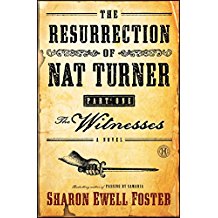Sharon Ewell Foster has written a memorable novel, The Resurrection of Nat Turner, Part One: The Witnesses, based on the true character Nat Turner (1800-1831), a slave born on a Virginia plantation.
Nat Turner’s mother, enslaved after being kidnaped from her home in Ethopia, was raped by her master, Benjamin Turner, resulting in the birth of her son. Nat was much loved by his mother who often spoke about his upper-class African heritage. Benjamin Turner allowed Nat to be instructed in reading, writing, and religion. He was an exceptional student, to the dismay of other slave owners, fearing an educated slave could cause trouble.
And trouble he caused. Nat Turner became a preacher who claimed he had been chosen by God to lead slaves from bondage.
The novel goes into some detail about the kidnapping of Africans, bringing them to America to be sold to land owners as laborers. Ill treated, often without proper clothing for the cold Virginia winters, nor given adequate food, the plight of a slave was dismal. Punishments, often undeserved, were harsh. Families were often separated for profit.
At first Nat Turner tried talking to various people about the injustices of slavery, claiming it was against God’s will. When that failed, he led an uprising that left over fifty white people dead. The resulting trials were a mockery of the law with unsubstantiated testimonials, unreliable witnesses, and death to many innocent slaves whose execution actually brought profit to their owners. Nat Turner’s rebellion brought nationwide attention to slavery and fueled abolitionists’ cause.
The Resurrection of Nat Turner discusses the injustice and horror of slavery. The novel is quite graphic and at times relentlessly grim. The cruelty and bigotry of people who considered themselves Christians was troubling. The novel, though at times dark, is obviously well researched. I enjoyed Sharon Ewell Foster’s writing style and appreciated seeing another view of African religion and its parallels to what we call Christianity.
This novel’s sequel, The Resurrection of Nat Turner, Part Two: The Testimony, reveals the story of Nat Turner through his own eyes.
For another view of our nation’s history, read The Resurrection of Nat Turner, Part One: The Witness. It’s stark frankness is enlightening and answers questions about attitudes, slavery, and hardships of the period.



It amazes me how one individual considers, justifies, and carries out such barbaric acts. Slavery is unconscionable. As is racism on any level. Would it be nice if humans could be kind and generous? What peace we’d have in the world. I agree with God giving us free-will, but it’s heartbreaking what humans decide to think, say, and do. Fabulous review, Mary.
I can’t imagine how one race of people can consider themselves superior to another. Or, to be current with the times, how man can consider himself superior to a woman. Actually though, I do see improvements in attitudes lately. It’s about time!
I so agree! On both accounts.
What a good lesson in history. Negative or positive, instead of ignoring it, it is good that some authors are making us aware by writing about it. You have summarized the story very well, Mary.
Thank you, Hema. It wasn’t always a pleasant book to read, but like you say, an important part of our history.
Mary:
The fact that such dismal, inhumane things sit festering in our nation’s past is frustrating. Normally I would not read such a depressing tale, but I feel a responsibility to educate myself and be a more aware citizen. Thank you for your inspiration.
And, not only that, Judith, so much of the unfairness still exists. I can’t imagine how anyone could justify slavery and the deplorable treatment to other humans. It IS depressing, but well done in this case.
Nice review, Mary. It’s only when books like these are written do they remind us of the injustices that happened in the past, only to remind us still of the injustices taking place in the present.
That true, Alice. It’s amazing that justice has/is taking so long. Old ways and opinions linger.